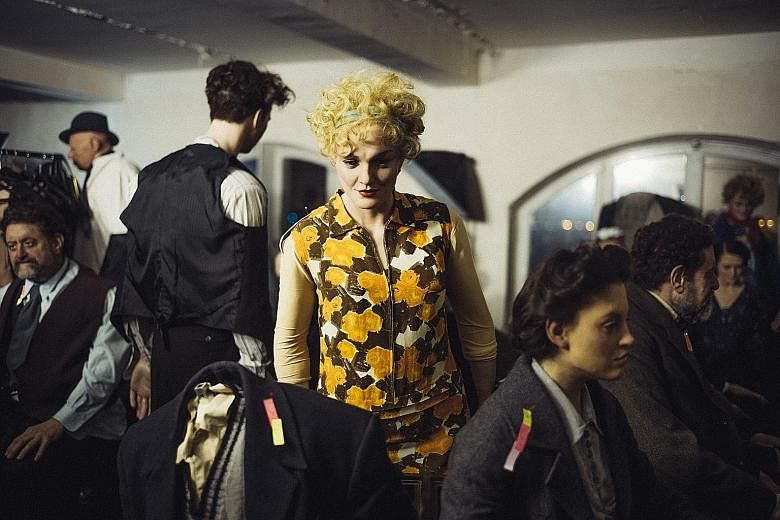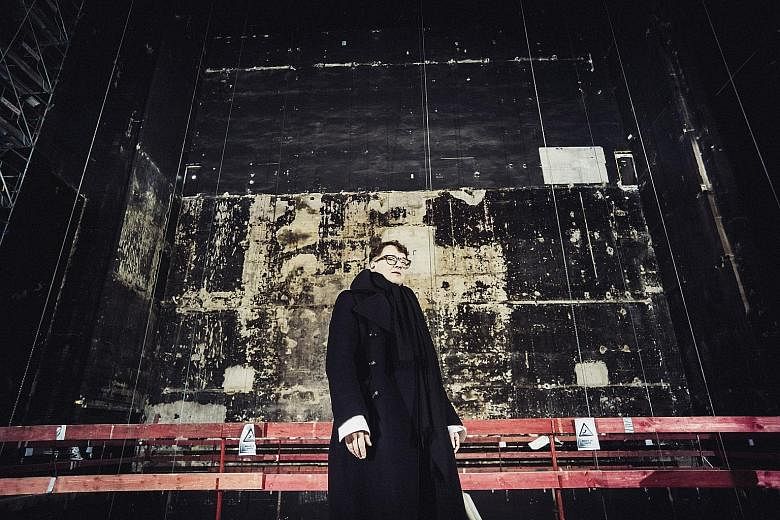PARIS • At the Institute, mathematical equations are written with chalk on blackboards by scientists wearing real laboratory coats.
Of course, in this mid-century Soviet science laboratory, there were no laptops, no Internet and no Wi-Fi.
There were, however, cameras, a director and a production staff who were turning the whole thing into a movie.
Between 2009 and 2011, Russian director Ilya Khrzhanovsky created the most ambitious film set of all time.
His living recreation of a theoretical physics institute took over the town of Kharkiv, Ukraine, and the actors lived their roles 24 hours a day.
No one had a script: If a character was to be a laboratory assistant, the person in the role simply had to live as a laboratory assistant.
Dau, the result of this provocative experiment, is finally on show for the first time in Paris, opening on Thursday and running through Feb 17.
The Theatre du Chatelet and Theatre de la Ville have been taken over with this genre-defying accomplishment, which ballooned from a movie into something between immersive theatre and a live video game.
Exhibition efforts have been plagued by problems.
The debut was initially planned for Berlin in September - intended as the first stop of a three-city tour that would then travel to Paris and London.
It was cancelled weeks before it was supposed to open, when city administrators rejected a proposal to build a concrete wall around the interactive spectacle.
The wall was intended to be 2.4km long and painted by Chinese artist Ai Weiwei, encircling the event until its final night, the anniversary of the fall of the Berlin Wall, when it would be torn down.
Once announced, the wall began to divide people (as walls do), stirring debates about painful historical events that are never far from the surface in Germany.
"I don't believe in reconstructing a totalitarian system as an experiment," said Ms Sabine Bangert, a politician from the Greens party, who, like many Berliners, felt that the construction of a concrete barrier just metres from where the Berlin Wall once stood was an insult to those whose lives had been torn apart by it.
However, many artists said refusing to show this work was cowardly censorship of artistic expression.
In the end, the wall proposal, which had been negotiated over several years, with millions of dollars of investment, was rejected because the paperwork was not filed correctly.
Its showing in Berlin is still an open question, but it is to open in London in April.
Paris officials received the project's premiere more enthusiastically, but it has nonetheless been forced to scale back its ambitions.
A proposed bridge that was supposed to arc over the Place du Chatelet, linking the two theatres for the duration of the event, was scrapped in part because of ongoing protests in the city, Khrzhanovsky said.
"The yellow jackets killed the bridge," he said in a telephone interview, because the city authorities were "afraid of terrorism".
A spokesman for the Paris Police said the bridge proposal was refused partly over security concerns, but also because it would have disturbed foot traffic in one of the city's busiest areas.
If the epic shoot was the first phase of the project, the premiere on Thursday is the beginning of the second - and it is just as ambitious.
Upon entering the installation, visitors hand over their cellphones, exchanging them for smartphone-like devices that guide them through the various interactive performances, happenings and film screenings.
Each visitor's experience will be different, although everyone will be invited to see at least one of the 13 feature-length films that have been cut from the footage.
This, however, is only a portion of the material available to watch.
A video-streaming platform, accessible in single-person booths, will show many more scenes, each tagged by character and theme, that let the viewer explore additional story lines.
What about the films? Naturalistic and engrossing, they lure the viewer into the characters' ethical dilemmas, scientific discussions and sexual encounters in real time.
The human search for freedom - whether within a politically repressive society, a scientific laboratory or a marriage - is a constant theme.
At times, the films show humanity at its lowest: Mental breakdowns and brutally degrading KGB interrogations all feature. It is made more shocking by the knowledge that the people appearing on screen are not acting, but rather, responding to their lived conditions.
"Nobody is ever in the middle of the road with this project," said Ruth Mackenzie, co-artistic director of Theatre du Chatelet. "You either find it provocative or exhilarating."
Khrzhanovsky said it was the project's confrontational nature that spooked officials in Berlin and forced him to scale back its ambitions.
He added: "If it's not possible to build a bridge in Paris or a wall in Berlin, it looks like art exists somewhere in a ghetto, where you can do things, but not visible, not provocative."
But Khrzhanovsky said he remained committed to Dau, despite the need to compromise on his vision.
"For me, satisfaction is when the project will meet the public," he said. "The public is the main collaborator in this phase."
Collaborators from the creative scene, like Mackenzie, are already convinced of the project's significance.
She said: "I've worked on a lot of ambitious projects, but this is the only one that has had mythic status before it's even started.
"It's the world premiere of something that's never been done before."
NYTIMES


